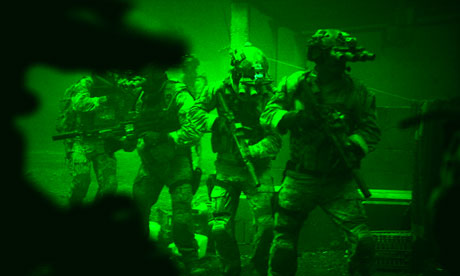
Director: Kathryn Bigelow
Entertainment grade: B–
History grade: C
Osama bin Laden was the leading figure in al-Qaida. His involvement with terrorist activity, particularly the attacks of 11 September 2001, made him one of the FBI's most wanted men. He was assassinated by an American special forces unit in Pakistan on 2 May 2011.
People
Setting itself up as a harder-edged and slightly less bonkers version of Homeland, Zero Dark Thirty follows Maya (Jessica Chastain), a fiercely driven, socially awkward CIA agent, on her pursuit of Osama bin Laden. She seems to be inspired by a real agent known as 'Jen' in No Easy Day, an account of the assassination mission written by former Navy Seal Mark Bissonnette under the pseudonym Mark Owen. How much resemblance Maya bears to reality – indeed, whether the equivalent real-life character is even a woman – are questions difficult for historians to answer conclusively while CIA secrecy remains in place.
Torture
Zero Dark Thirty has already run into a heap of trouble over its depiction of the CIA's use of torture. Some critics have argued that it "glorifies torture" or even constitutes "torture porn". Director Kathryn Bigelow has replied that "depiction is not endorsement". The practices shown in the first part of the movie tally with what the CIA has admitted about what it calls EITs, or "enhanced interrogation techniques", in an extensively redacted but still profoundly disturbing report released in 2009. Historically, the torture scenes are broadly accurate insofar as the CIA did use techniques like waterboarding, sleep deprivation and forcing detainees into tiny, coffin-like boxes. They may not be accurate in terms of their context in this film – particularly the fact that no one from the FBI or CIA is shown disputing their use – or the results they show.
Controversy
Zero Dark Thirty's torture scenes create the impression that these interrogations provided early clues as to the identity of Osama bin Laden's courier, who would ultimately lead the CIA to the man himself. This has outraged some US senators, including John McCain, who deny that in the strongest terms on the basis of their access to classified CIA material which is still not publicly available. The CIA document mentioned above says that: "The Agency's detention and interrogation of terrorists has provided intelligence that has enabled the identification and apprehension of other terrorists." This does not relate explicitly to the finding of Bin Laden, and not merely because the document was written before he was found. As war on terror expert Jane Mayer has pointed out, former CIA director Leon Panetta has stated that "we first learned about 'the facilitator/courier's nom de guerre' from a detainee not in the CIA's custody" and that "no detainee in CIA custody revealed the facilitator/courier's full true name or specific whereabouts".
Along with what the senators have said, and further evidence quoted by Mayer and others, this appears to corroborate the view that torture interrogations were irrelevant to finding Bin Laden. "Torture was, however, as we all know, employed in the early years of the hunt," Bigelow wrote. "That doesn't mean it was the key to finding Bin Laden. It means it is a part of the story we couldn't ignore." That depends on which story you're telling. Torture is part of the story of how the CIA operated in the early 2000s. Based on currently available evidence, though, there is a strong case to argue that torture is not part of the story of finding Bin Laden.
Languages
The most gripping part of Zero Dark Thirty is its final act: the raid on Bin Laden's compound in Abbottabad, Pakistan. This has been meticulously recreated, and is brilliantly performed, shot and edited. However, the street scenes leading up to it have provoked bemusement and hilarity among Pakistanis on Twitter – including the Oscar-winning filmmaker Sharmeen Obaid Chinoy, who otherwise praised the film – for having some dialogue in colloquial Arabic. Many languages are spoken in Pakistan, but not that one.
Geography
Meanwhile, all the supposed experts in Zero Dark Thirty mispronounce Abbottabad (the stress should be on the first syllable, not the second; it's named after General Sir James Abbott) and Peshawar (the stress should be on the second syllable, not the first). Find Osama bin Laden? You wouldn't even trust these people to give you directions to the next town. Nor should you. "If you take a right out of Islamabad, drive about 45 minutes north, you'll find yourself here: Abbottabad," one agent tells the CIA director (James Gandolfini). Only if you're driving a helicopter. Also, if you're leaving from the US Embassy, it's a shorter land route if you take a left.
Verdict
Zero Dark Thirty is an accomplished and undeniably powerful piece of film-making – but chilling, and not always for the reasons it intends.
With many thanks to Saba Imtiaz.

